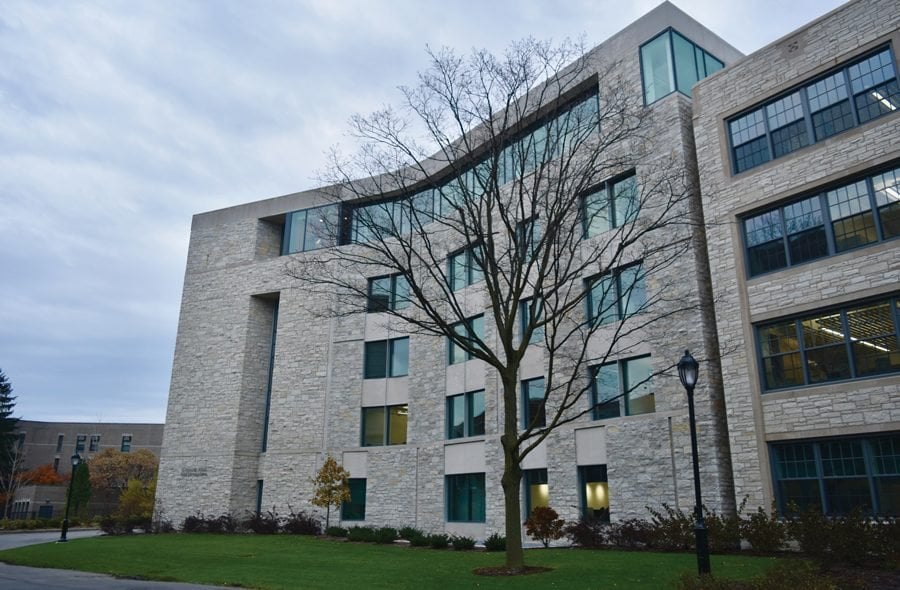“Another chapter in a very old, very long, very American story”: Scholars discuss Atlanta spa shootings
Daily file photo by Brian Meng
Crowe Hall, home of the Asian American Studies Program. On Wednesday, the program hosted speakers from Northwestern University, Brandeis University and Dartmouth College who discuss the history of racialized and sexualized violence towards Asian Americans.
April 8, 2021
Northwestern’s Asian American Studies program co-hosted a panel Wednesday alongside Brandeis University and Dartmouth College to discuss the ways the recent Atlanta spa shootings reveal historically racialized and sexualized violence towards Asian Americans.
History and Asian American Studies Prof. Ji-Yeon Yuh began the discussion with an overview of Asian stereotypes that are central to anti-Asian racism and violence.
She said there are three core ideas to these stereotypes: one, that Asians are “perpetual foreigners” to Western countries such as the United States two, that they pose a threat to the proper functioning and morals of a society and three, that their sexuality and gender identities are abnormal and deviant.
“The most commonly known and named stereotypes, including the yellow peril, model minority and dragon lady, have these components,” Yuh said.
In particular, Yuh said Asian men are depicted as effeminate and asexual in American history. However, Asian women are stereotyped to be hyperfeminine and hypersexual, she said. Yuh cited the 1875 Page Act, which prohibited the entry of Asian women into the United States based on the stereotype that they were sex workers.
Yuri Doolan, assistant professor at Brandeis University’s History and Women’s, Gender and Sexuality departments, said the Atlanta spa shootings follow a historical pattern of sexual abuse against Asian women, which partially stemming from U.S. military occupation in South Korea during the 20th century.
Overly dependent on the U.S. dollar for survival, Koreans in camptowns were left with no means to make a living when the U.S. military withdrew its troop presence in Asia. As a result, camptowns began sending sex workers to the U.S. in search of new markets. They would often open massage businesses to cater to local populations.
“There is no confirmation whether ornot the victims (of the Atlanta shootings) identified as sex worker,” Doolan said. “It’s likely that they were working in the massage industry because of their status as immigrant working class women of color with limited English proficiency.”
Carolyn Choi, a postdoctoral researcher in residence at Dartmouth College’s Asian and Asian American Studies program, interviewed a Korean migrant hostess who told her that immigration authorities racially profile Asian migrants. If they “find something off,” Choi said the authorities will search people’s phones and ask to see their messages on KakaoTalk, a popular messaging app in South Korea.
To further illustrate the impact of policing on Asian migrants in the U.S., Elena Shih, assistant professor of American Studies and Ethnic Studies at Brown University, discussed how different states’ efforts to combat human trafficking in Asian-owned massage parlors eventually turned into increased surveillence and policing.
Shih cited state legislation in North Carolina that requires all massage parlors to display posters with the phone number for the National Human Trafficking Hotline in their waiting rooms. In addition, the bill required all workers to have high school diplomas from the U.S. and be proficient in English.
The panel ended with a reflection on current activism and community organizing in light of the Atlanta spa shootings.
“We’re seeing our communities come together to fight against the particular forms of individual violence and brutality,” Shih said. “It’s also important to reckon with the erasure and shadows of this movement, and be reminded that state sanctioned violence is also a part of understanding these everyday forms of individual violence.
Email: tianqili2022@u.northwestern.edu
Twitter: @SkyeLi87858984
Related Stories:
— Community leaders decry anti-Asian racism in community vigil



